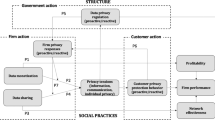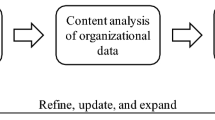Abstract
This paper uses a business model framework to help identify the issues that developers of virtual worlds have to address as their enterprises mature. While most virtual worlds have adopted subscription models there is an increasing trend toward selling digital items directly to users. This arises from the emergent markets linking real world currency to items existing on company servers. This practice has resulted in controversial and unresolved legal issues. Communities that arise from virtual worlds can be classified according to level and type of control. Lack of control can lead to a Hobbesian world of predation and vigilantism. Strong developer control can be exerted to protect users but communities adopting shared governance with users are likely to become more common.
Similar content being viewed by others
References
Amit, R., & Zott, C. (2001). Value creation in e-business. Strategic Management Journal, 22, 493–520.
Au, W.J. (2004). The first warning sign of encroaching capitalism and corporate influence. Available at http://secondlife.com/notes/2004_01_19_archive.php#20040119
Blanchard, A., & Horan, T. (1998). Virtual communities and social capital. Science Computer Review, 16, 293–307.
Bradley, C., & Froomkin, M. (2003). Virtual worlds, real rules. Telecommunications Policy Research Conference.
Bruynseels, K., & Vos, J. (2000). Organisation and visualisation of tacit knowledge in virtual communities. In virtual worlds (Vol. 1834, pp. 24–31).
Buchanan, J.M. (1975). The limits of liberty: Between anarchy and leviathan. Chicago: University of Chicago Press.
Castronova, E. (2003). EverQuest to Launch Casino. Availbale at http://terranova.blogs.com/terra_nova/2003/12/everquest_to_la.html
Castronova, E. (2002). On virtual communities. CESIFO Working Paper, 752.
Castronova, E. (2004). Synthetic world economic Data. Availbale at http://business.fullerton.edu/ecastronova/Synthetic%20Worlds%20Economic%20Data/economic_data.htm
Castronova, E. (2001). Virtual worlds: A first hand account of market and society on the Cyberian frontier. CESifo Working Paper, 618.
Daniel, B., McCalla, G., & Schwier, R. (2002). A process model for building social capital in virtual learning communities. In International Conference on Computers in Education, Vols. I and II, Proceedings (pp. 574–575).
De, R. (2003). Social resistance and the self in virtual communities. The Ninth Americas Conference on Information Systems (AMCIS).
Dibbell, J. (2003). “Owned!: Intellectual property in the age of dupers, gold farmers, eBayers, and other enemies of the virtual state. The State of Play: Law, Games, and Virtual Worlds.
Dibbell, J. (2003). The unreal estate boom. in wired, vol. 11.
Duh, R., Jamal, K., & Sunder, S. (2001). Control and assurance in e-commerce: Privacy, Integrity and Security at eBay. Sloan Management Review, 43, 17.
Eliasson, G., & Wihlborg, C. (2003). On the macroeconomic effects of establishing tradability in weak property rights. Journal of Evolutionary Economics, 13, 607–632.
Ginsburg, M. (2001). Growing out of its skin: Principles of the evolution and extension of the Internet Chess Club, 1995 to Present. Proceedings of the Seventh Americas Conference on Information Systems (AMCIS 2001).
Hagel, J., & Armstrong, A.G. (1996). The real value of on-line communities. Harvard Business Review May–June, 134–141.
Jansen, W., Steenbakkers, G.C.A., & Jagers, H.P.M. (2000). Knowledge management and virtual communities. In Challenges of information technology management in the 21st century (pp. 984–988).
Kahin, B., & Varian, H.R. (2000). Internet publishing and beyond—The economics of digital information and intellectual property—Introduction. In Internet Publishing and Beyond (pp. 1–5). Cambridge: MIT Press.
Kardaras, D., & Karakostas, B. (2000). Virtual communities in banking: An empirical study. In Bis 2000 (pp. 245–254).
Klang, M., & Olsson, S. (1999). Building communities online. In Proceedings of Fourth International Workshop on Cscw in Design (pp. 43–52).
Lastowka, F.G., & Hunter, D. (2004). The laws of the virtual worlds. California Law Review, 92.
Lawsuit fires up in case of vanishing virtual weapons. Available at http://www.chinadaily.com.cn/en/doc/2003-11/20/content_283094.htm
Lessig, L. (1999). Code and other laws of cyberspace. New York, NY: Basic Books.
Lessig, L. (2002). The future of ideas: The fate of the commons in a connected world. New York, NY: Random House.
Litman, J. (2001). Digital copyright protecting intellectual property on the internet. Amherst: Prometheus Books.
Ludlow, P. (2004). Griefers and group formation in Alphaville. Times of London, January 31, 2004.
Lueg, C. (2001). Information dissemination in virtual communities as challenge to real world companies. In Towards the E-Society: E-Commerce, E-Business and E-Government (Vol. 74, pp. 261–270).
MacInnes, I. (2002). Business models for interactive entertainment communities. International Telecommunications Society Biennial Conference.
MacInnes, I. (2005). Dynamic business model framework for emerging technologies. International Journal of Services Technology and Management.
MacInnes, I., Kongsmak, K., & Heckman, R. (2002). Barriers to digital distribution in the book and software industries. International Conference on Electronic Commerce.
Mueller, M. (2002). Ruling the root: Internet governance and the Taming of cyberspace. Cambridge, MA: MIT Press.
Ondrejka, C. (2003). Escaping the gilded cage: User created content and building the metaverse. The State of Play: Law, Games, and Virtual Worlds.
Reeves, H.S. (1996). Property in cyberspace. University of Chicago Law Review, 63.
Rheingold, H. (1993). The virtual community: Homesteading on the electronic frontier. Reading, MA: Addison-Wesley Pub. Co.
Schlachter, E. (1997). The intellectual property renaissance in cyberspace: why copyright law could be unimportant on the Internet. Berkeley Technology Law Journal, 12.
Schroder, D., & Yin, P. (2000). Communications of the ACM, 43.
Schubert, P., & Koch, M. (2002). The power of personalization: Customer collaboration and virtual communities. Eighth Americas Conference on Information Systems (AMCIS).
Sharp, C. (2003). Business integration for games: An introduction to online games and E-business infrastructure. Available at http://www-106.ibm.com/developerworks/webservices/library/ws-intgame/
Taylor, T.L. (2002). Whose game is this anyway? Negotiating corporate ownership in a virtual world. Computer Games and Digital Cultures.
Vasilopoulou, K., Pouloudi, N., Patronidou, S., & Poulymenakou, A. (2002). Business models: A proposed framework. e-Business and e-Work Annual Conference.
Wathne, K., & Heide, J. (2001). Choice of supplier in embedded markets: Relationship and marketing program effect. Journal of Marketing, 65, 36–51.
Williams, R., & Cothrel, J. (2000). Four smart ways to run online communities. Sloan Management Review, 41, 81–91.
Author information
Authors and Affiliations
Corresponding author
Additional information
Ian MacInnes joined the faculty of Syracuse University's School of Information Studies in 1999 and is now an Associate Professor. Previously he spent two years at the University of Minnesota's Carlson School of Management after completing a doctorate from the University of Southern California in Political Economy and Public Policy and a master's degree at the London School of Economics. He was also a Fellow at Harvard's Kennedy School of Government. His current areas of research include pure digital transactions for content, software, and services; industry convergence; electronic commerce transformation; trust and fraud in electronic markets; virtual communities; and business models for online entertainment.
Rights and permissions
About this article
Cite this article
MacInnes, I. Property rights, legal issues, and business models in virtual world communities. Electron Commerce Res 6, 39–56 (2006). https://doi.org/10.1007/s10660-006-5987-8
Issue Date:
DOI: https://doi.org/10.1007/s10660-006-5987-8




